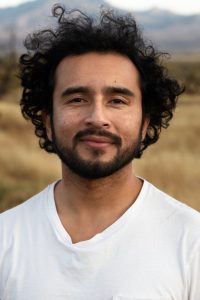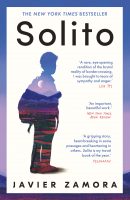
August 10, 2023
Some of the best non-fiction of recent years has been on travels that were forced rather than longed-for: the journeys of refugees and migrants. My favourite book of 2022 was one such work: ‘Solito’, by JAVIER ZAMORA, which is out this week in paperback in the UK. In it, Zamora recreates the 3,000-mile odyssey he made at nine years old, from his small town in El Salvador to the United States, to be reunited with a mother he hadn’t seen in four years and a father he barely remembered. His grandfather went with him as far as Guatemala. Then — as he recalls in this extract — he was on his own among strangers
We’re in Ocós: a small fishing town. In La Herradura [his home town] I heard the ocean waves crashing against the rocks only during big storms. The estero water underneath the pier was calm, sweet, and surrounded by mangroves. If I wanted to get to the ocean, it was a thirty-minute boat ride through the mangroves. Here, the ocean is walking distance, a few blocks away, the loud roar of the tides. The sand, the breeze, the salt in the air remind me of home.
Here at night I stare at the ceiling, waiting for something to fall on my bed—a cockroach in my mouth, a spider on my eye, a scorpion at my feet. There’s no mosquito net hanging on top of my bed like back home. Grandpa isn’t here to talk to me before falling asleep, to go out for walks and explore the town, and because of that I feel alone, lonely, solo, solito, solito de verdad.
The adults don’t really talk to me besides “good morning,” “good night,” “pass the food,” “wake up.” And I’m too shy to talk to them, awkward, so I mostly keep to myself and stay out of their way. When the adults talk, I look at my hands. I hold them together and play with my thumbs. I don’t know what to say. Who to stay close to. Marcelo [a man from La Herradura] pays no attention to me. All he does is smoke and drink. I feel like wet sand. Like mud. Like the corn dough Abuelita makes pupusas with, her fingers making and breaking clumps, clap clap clap.
I’m in a room with Patricia and Carla. Our room is small. We let the fan buzz all night, all day, in order to keep us cool and keep the mosquitoes away. My bed is across from theirs. I can almost touch where Patricia and Carla sleep, next to the window, with my arm. Patricia’s and Carla’s eyebrows get closer together whenever I do anything. I annoy everyone. So I just stay in the room, try to sleep, look at the map, memorise things. I want Grandpa to be here. I watch how Patricia makes sure Carla eats everything on her plate. How she tucks her in at night. Kisses her forehead before bed. In the morning, she brushes her daughter’s black wavy hair, braids it or puts it up in a ponytail, lays out her clothes on the bed. Grandpa told me to stay close to Marcelo, but when I try to talk to him, he tells me to leave him alone. He only talks to me when he sends me out to fetch his daily pack of Marlboros.
Our first night here, Don Dago [the “coyote”, or people smuggler, who took Javier’s mother to the US] tells us the “new plan”: we’re crossing into México aboard boats. We’re skipping Tapachula, Chiapas. Grandpa’s blue line on the map is being revised and stretched into the Pacific Ocean toward Oaxaca, but Grandpa doesn’t know. None of my family knows. They think we’re taking the bus to cross the river on a raft. All the adults here thought that también.
Marcelo raises his voice, hits the plastic table we eat on—if he had something in his hands, he would throw it. Chino yells at Don Dago, and I’m scared. I didn’t know Chino could get that mad. Chele stays quiet. Patricia screams at Don Dago también. Everyone’s skin is now a bit darker, except for Chele, whose skin has gotten red, bright pink like a cooked shrimp. I listen, try to hide like a shadow when the adults speak.
It’s weird staying in a room with a woman who isn’t Mali [his aunt] or Mom. I don’t feel comfortable. Plus, I think I like Carla. I’m worried I’m going to fart, or snore, or do something embarrassing. I don’t want her or Patricia to see me naked, so when I shower I take all my clothes to the shower room, next to the last room on this side of the motel.
Inside, a showerhead lets water fall like rain on the cement floor. A curtain is the only privacy. There’s a well with a motor, but the pump fills a giant plastic tub behind the shower room. I shower only when no one else does. Pooping is the same. It’s been hard without Grandpa to not be afraid that I’m going to get flushed down the toilet and out to sea.
I’ve been quiet. Patricia checks on me as much as she can, but she has her daughter to worry about. I try to do everything right. I wash my hands, I shower by myself, I don’t ask for help, I eat everything on my plate, I clean up, make my bed, mind my own business. I don’t want anyone to think I’m a little kid.
The next night, Don Dago brings the men a case of Negra Modelos—his favourite beer. When they finish it, they go out and buy cheaper beers, Gallo or Sol. Chele has to stop Chino and Marcelo from fighting over their tattoos. One doesn’t like the other’s, or something. Don Dago doesn’t drink more than one beer with them, but by then, the men start asking questions about when we’re leaving, and it escalates into screaming at Don Dago, who grasps his Negra Modelo and listens, picking at the gold paper wrapping around the bottle’s cap. Marcelo is the first one who shouts, he’s the loudest and drunkest. Chele threatens to return to El Salvador, says that he wants his money back. Chino throws a Modelo bottle at Don Dago’s feet and tries to tackle him. Don Dago remains seated in his plastic chair. It isn’t hard for the other men to stop Chino. He’s so skinny. I’m afraid Marcelo is going to kill him—he could, but he’s too drunk to land a punch.
It scares me. Like when Grandpa drank before Mom left, when he broke the kitchen door, shot his gun at the sky when Mom broke our blender across his feet. The next day I stay away from the men. I know Grandpa told me to “stay close to Marcelo,” but he’s the scariest one, always drinking, smoking, arguing.

© Javier Zamora 2022
Extracted from ‘Solito’ by Javier Zamora (Oneworld, £10.99)
Javier Zamora was born in El Salvador in 1990. He was one year old when his father fled the country and about to turn five when his mother, too, left, both migrations caused by the Salvadoran Civil War. When he was nine, Javier migrated through Guatemala, Mexico and the Sonoran Desert. His debut poetry collection, Unaccompanied, explores the impact of the war and immigration on his family. Zamora has been a Stegner Fellow at Stanford and a Radcliffe Fellow at Harvard and holds fellowships from the National Endowment for the Arts and the Poetry Foundation. Solito, which has been critically acclaimed, won him the Los Angeles Times Christopher Isherwood Prize for Autobiography and an American Library Association Alex Award.
